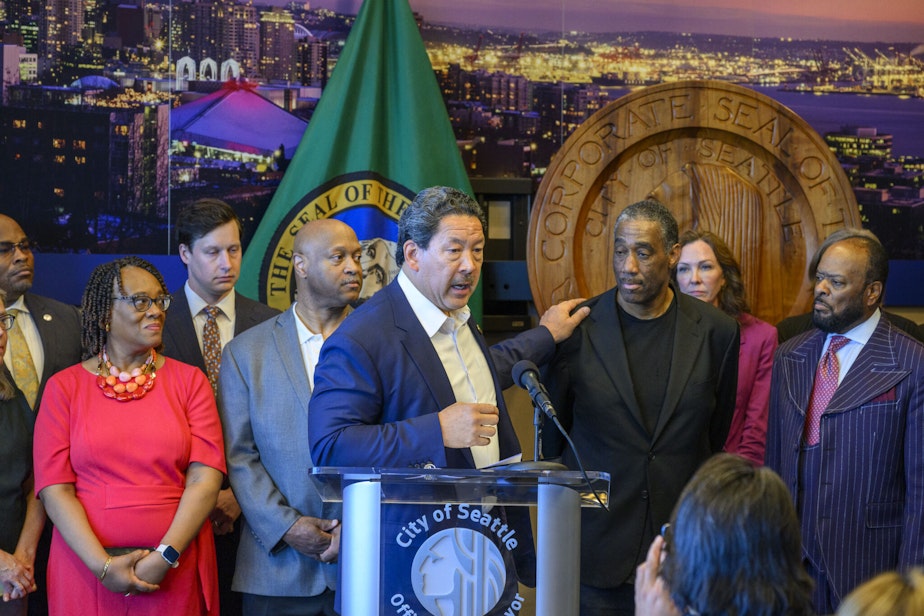Can mayor's proposal mend rift between Seattle and Washington's drug laws?

Seattle Mayor Bruce Harrell has a new proposal that not only aims to establish a public drug-use law, it endeavors to gain the City Council's approval.
“Success will not – and cannot – be measured on how many people cycle through jail; instead, our focus is on improving connections to lifesaving treatment and expanding program options to better meet the needs of those with substance use issues," Mayor Harrell said in a statement. "Today’s announcements represent important steps forward toward a safer, healthier Seattle, as we continue to act with urgency to build out a bold health-first approach, help those in need, curtail impacts of public drug consumption, and hold dealers and traffickers accountable.”
This is the city's latest attempt to pass a drug law. In June, the Seattle City Council voted down a proposal to align the city's code with the state's newly passed drug laws. That prompted the mayor to form a 24-member task force with the goal of developing a more favorable bill.
The result is a new bill that Harrell is now sending to the City Council for consideration. The mayor's office argues that it will codify the state's public drug consumption laws with the city's laws, and make the offense a gross misdemeanor. It also sets up diversion and treatment programs as the "preferred approach" in such cases. There will be definitions around drug use that poses harm to others and use that poses harm to the individual.
It's a suite of approaches with the goal of getting enough council votes to pass.
“This package is a balanced approach to respond to the crisis fentanyl has brought to our streets," Councilmember Andrew Lewis said in a statement. "This legislation, that I will co-sponsor, responds to the needs I laid out at the beginning of this process and gives our first responders the tools they need to divert to services where possible and make arrests when necessary. I applaud Mayor Harrell for convening the key partners in city government to get this critical work done."
Sponsored
Lewis was the swing vote on the council that caused the previous proposal to fail.
Along with the bill, Mayor Harrell will issue an executive order instructing the Seattle Police Department how to handle public drug use.
“We are committed to aggressively targeting the supply chain of fentanyl and other deadly drugs, and to support those struggling with addiction," Police Chief Adrian Diaz said in a statement. "It’s a dual approach to a complex problem; one that involves not just enforcement, but prevention, education, and treatment.”
The mayor also proposes to invest a total of $27 million to pay for opioid treatment and related facilities. The funding is coming from settlement money the city received from opioid lawsuits. Among the criticism for the city's previous drug law proposal was that Seattle didn't have adequate drug treatment facilities where cases could be diverted.
The plan is to spend $7 million in 2023 on "capital investments in facilities to provide services such as post-overdose care, opioid medication delivery, health hub services, long-term care management, and drop-in support," according to a statement from the mayor's office.
Sponsored
The remaining $20 million is slated for long-term programs, such as the city's post-overdose response team, mobile opioid medication delivery, and harm reduction.
Following Mayor Harrell's announcement Monday morning, the Downtown Seattle Association released the following statement:
“Mayor Harrell is bringing this legislation forward at a critical time in downtown Seattle. The city cannot afford to delay in passing this measure. Seattle’s drug crisis is a public health emergency that is worsening by the day and one that demands urgent action. We see this emergency and its impacts daily in downtown. Allowing these conditions to persist is inhumane and unacceptable both for those in the throes of debilitating and life-threatening addiction and members of the public who are exposed to toxic fumes on our streets, in our parks and on our public transit systems. Our ambassador teams have been on the front lines of this epidemic and have revived people on sidewalks and alleys, administering Narcan to 108 individuals since the start of 2023. At a critical time for the recovery of downtown, the use of dangerous drugs in our public spaces is a significant contributing factor to residents, employees, families and visitors feeling unsafe exploring our city or returning to the office. In fact, in a poll we commissioned in May, a full 77% of voters agreed with the statement ‘Seattle’s hands-off approach to people using illegal drugs in public is contributing to rampant street crime and is making it much harder for downtown to recover’, 63% of those strongly agreed. Our June letter to city leaders called for immediate action and a comprehensive plan that includes treatment, outreach and clarity on enforcing our laws. This legislation is desperately needed.”


